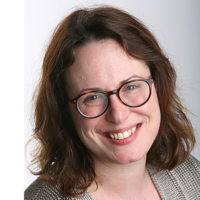STRATEGIES
A GUIDE TO NETWORKING REMOTELY
How to establish connections while social distancing.
read nowReporter, New York Times
 Maggie Haberman has a front row seat to the modern political era. Her political reporting career has taken her from New York City Hall to the Oval Office to cover the Trump administration.
Maggie Haberman has a front row seat to the modern political era. Her political reporting career has taken her from New York City Hall to the Oval Office to cover the Trump administration.
As a White House Correspondent for The New York Times, Haberman was a part of the 2018 Pulitzer-prize winning team that covered the Russia investigation. She is now on leave to write a book about former President Trump.
Throughout her career, which includes past roles at The New York Post, The New York Daily News and Politico, Haberman has seen firsthand the impact of disinformation—and is in relentless pursuit of the truth.
Haberman spoke with New York Women in Communications (NYWICI) to talk about being a journalist in today’s world and what winning a NYWICI Matrix Award this year means to her.
Being a journalist in today’s world is different than several decades ago when there were a handful of news outlets. These days, the news environment is so dispersed that readers can basically choose what news they want to pay attention to and tune out what they don’t.
Being a reporter is navigating that. It is also navigating a lot of disinformation—and that does not have to be professionally sent out through some organized means, like a foreign country. There are websites that put out information that is not true. There are elected officials who say things that are not true.
My first-ever politics-related assignment was covering Rudy Giuliani’s reelection tour for mayor in 1997. Politics is the lead-up to policy in this country. It is how policy gets made. We also tend to treat politicians as larger-than-life figures. They can hold outsized media attention and have a way of becoming more nationalized, especially in New York. I think all of those are reasons why I originally got into it.
I’ve seen over time the impact that our system has on individuals: the way in which policy is crafted, the way in which it’s either executed or not executed, the way in which small lies told by politicians can give way to bigger lies or untruths and how corrosive that can be.
My father’s job was so consuming for him—he was a foreign correspondent for The Times through most of my childhood. It did not make journalism very appealing to me. I also didn’t want to do what my mother did, though my mother is a very good talker and very good at establishing relationships. I do think that had an impact. My father had a tremendous sense of the importance that journalism plays in society and how devoted journalists are to the story. While I didn’t feel like I was absorbing that in real time, I think it was more than I knew.
Working on aspects of the Russia investigation into Trump was really important. A lesson for everyone is that you can’t write more than you know. I think there was a desire on the part of readers to have some kind of conclusion around a lot of the investigation that we just were not equipped to give them. It’s important to bear in mind that you only have the facts that are in front of you.
You have to make a concerted effort to not let it seep in, which does not mean don’t listen to criticism. It is important for reporters to hear criticism, but it’s also important to understand the difference between legitimate criticism and trolling. Twitter, I think, has obliterated the line between the two.
It is a huge honor. It is humbling to be following such incredible women who have been honored. I think the Matrix Awards are unique in that women are being honored for their accomplishments. Too often, women have been given awards as a tack-on to those for men.
Because of the way journalism has traditionally worked in newsrooms, my mentors are generally men. But I had the privilege of working with incredible women who I’ve learned a lot from: Helene Cooper at The Times is one of them and Elisabeth Bumiller, the Washington Bureau Chief, who I actually first met when we were both covering City Hall in 1999.
I feel like I have an obligation to pass along a lot of what I’ve learned over time. Your words can weigh very heavily on the younger generation so choose them carefully.
Read as much as possible, but try to understand that a lot of news sources that you’re picking from might not be as good as they once were. And some advice that I often don’t follow myself is to be judicious on social media.
This interview has been condensed and edited for clarity.
Julia Corbett is an associate content director at Accenture Interactive.
How to establish connections while social distancing.
read nowWhat’s on the minds of industry leaders? Listen to our podcast to find out.
Book a free appointment with one of our top-rated coaches.